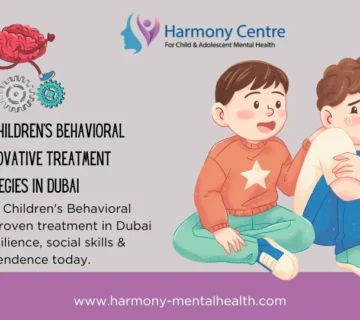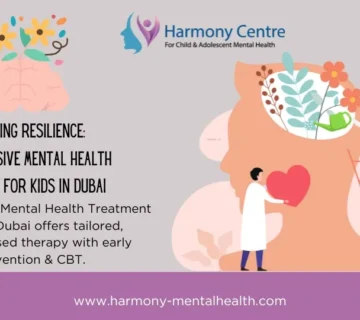Digital Addiction Children Dubai: Strategies to Manage Excessive Screen Time at Harmony Centre
Discover effective strategies to manage digital addiction in children in Dubai at Harmony Centre. Learn tips to reduce screen time and promote healthier habits.
Contact Information
| Contact Method | Details |
|---|---|
| Phone | +971 (52) 8773268 / 04 558 2015 |
| Click Here | |
| info@harmony-mentalhealth.com | |
| Address | Office 409, Building Alrazi-64C, 26th St, Healthcare City, Dubai |
Introduction
In today’s hyper-connected world, children are increasingly exposed to digital devices from an early age. In Dubai’s vibrant urban environment, this exposure can sometimes lead to digital addiction—a condition characterized by excessive use of electronic devices such as smartphones, tablets, and video games. At Harmony Centre Mental Health Dubai, we understand that digital addiction can impact a child’s academic performance, social interactions, and overall mental well‑being. Our evidence‑based approach combines expert counseling, family support, and practical strategies to help children develop healthier digital habits and achieve balanced lifestyles.
Learn More About Harmony Centre • Contact Us
Understanding Digital Addiction in Children
What Is Digital Addiction?
Digital addiction in children refers to an excessive, compulsive use of digital devices that interferes with daily life. It can manifest as prolonged screen time, neglect of responsibilities, and difficulty disengaging from electronic activities even when it negatively affects health or relationships.
Core Characteristics
- Excessive Screen Time:
Spending inordinate amounts of time on devices, often at the expense of sleep, physical activity, and face‑to‑face interactions. - Preoccupation with Digital Content:
Constantly thinking about, or planning for, the next online session or gaming experience. - Withdrawal Symptoms:
Experiencing irritability, anxiety, or sadness when not able to use digital devices. - Neglect of Other Activities:
Avoiding homework, outdoor play, and social engagements in favor of digital entertainment. - Impaired Social Skills:
Reduced ability to interact with peers, leading to social isolation or communication difficulties.
The Impact of Digital Addiction on Children
Academic Challenges
Excessive screen time can distract children from educational activities, leading to:
- Decreased Concentration:
Continuous digital stimulation may make it difficult for children to focus on academic tasks. - Lower Academic Performance:
With less time dedicated to homework and studying, academic results can suffer. - Disrupted Sleep Patterns:
Late-night screen use can interfere with sleep quality, further affecting learning and memory retention.
Social and Emotional Consequences
Digital addiction can also affect a child’s social interactions and emotional health:
- Reduced Face-to-Face Communication:
Heavy reliance on digital communication can impair the development of essential social skills. - Increased Anxiety and Depression:
Overuse of social media and digital devices is linked to higher rates of anxiety, depression, and low self-esteem. - Isolation:
Excessive screen time may lead to social withdrawal, preventing children from forming meaningful relationships.
Physical Health Concerns
Prolonged digital exposure is associated with several physical health issues:
- Sedentary Lifestyle:
Excessive screen time contributes to physical inactivity, which can lead to obesity and related health problems. - Eye Strain and Headaches:
Continuous exposure to screens may cause visual discomfort, eye strain, and headaches. - Poor Posture:
Prolonged sitting and improper ergonomics can lead to musculoskeletal problems.
Strategies to Manage Digital Addiction
Establishing Healthy Digital Habits
Effective management of digital addiction begins with establishing boundaries and creating a balanced routine.
Set Clear Limits
- Screen Time Rules:
Define specific time limits for digital device usage daily. Use tools like screen time trackers to monitor usage. - Scheduled Digital-Free Times:
Encourage breaks from devices, especially during meals, homework, and bedtime routines.
Encourage Alternative Activities
- Physical Activities:
Promote regular exercise or outdoor play to replace screen time and improve physical health. - Creative Hobbies:
Engage children in hobbies such as drawing, reading, or playing musical instruments to stimulate their creativity. - Social Engagement:
Foster opportunities for in-person social interactions through sports, clubs, or family gatherings.
Create a Conducive Environment
- Designated Device Zones:
Establish specific areas in the home where digital devices are allowed, and keep other areas device-free. - Bedtime Routines:
Remove electronic devices from bedrooms to ensure a restful sleep environment. - Family Involvement:
Encourage families to participate in digital detox activities together to reinforce healthy habits.
Our Approach at Harmony Centre
Comprehensive Digital Behavior Assessments
At Harmony Centre, we start by evaluating your child’s digital habits through comprehensive assessments that involve:
- Parental Interviews:
Detailed discussions with parents to understand the child’s current screen time, favorite activities, and any concerns regarding digital usage. - Standardized Questionnaires:
Tools that measure the extent of digital addiction and its impact on academic, social, and emotional well‑being. - Behavioral Observations:
Direct observations during therapy sessions to identify specific triggers and patterns associated with digital use.
Learn More About Our Assessment Process
Personalized Intervention Plans
Based on our assessments, our multidisciplinary team designs personalized intervention plans that address digital addiction effectively.
Individual Counseling Sessions
- Cognitive Behavioral Therapy (CBT):
CBT techniques help children recognize negative thought patterns related to digital use and develop healthier coping strategies. - Mindfulness and Stress-Reduction Techniques:
Incorporate mindfulness exercises to reduce anxiety and improve focus, helping children manage urges to overuse digital devices. - Goal Setting:
Work with your child to set realistic and measurable goals for reducing screen time and engaging in alternative activities.
Family-Centered Interventions
- Parental Workshops:
Provide parents with strategies to manage digital addiction at home, such as creating structured routines and setting consistent limits. - Family Counseling:
Involve the entire family to foster a supportive environment that reinforces healthy digital habits. - Home Practice Programs:
Tailored activities for families to practice together, ensuring that digital detox practices are maintained between therapy sessions.
Group Therapy and Peer Support
- Interactive Group Sessions:
Group therapy offers a platform for children to share experiences and learn from peers about managing screen time. - Social Skills Training:
Improve interpersonal skills through collaborative activities that reduce reliance on digital interactions. - Motivational Feedback:
Positive reinforcement from peers and therapists builds self-esteem and encourages adherence to digital time limits.
Digital Integration for Continuous Support
Telehealth Services
- Virtual Consultations:
Our secure telehealth platform allows for ongoing support, enabling regular check-ins without the need for travel. - Digital Tracking Tools:
Use mobile apps and online platforms to monitor screen time, track progress, and adjust intervention strategies in real time. - Interactive Educational Content:
Access digital resources, including videos and interactive modules, that educate children about the importance of healthy digital habits.
Ongoing Monitoring and Follow-Up
- Regular Follow-Up Sessions:
Continuous monitoring through scheduled appointments ensures that interventions are effective and that adjustments are made as needed. - Feedback Mechanisms:
Consistent communication with parents, educators, and children helps refine the treatment plan and sustain progress over time.
Explore Our Digital Resources
Get in Touch
Evidence-Based Outcomes and Success Stories
Quantitative Improvements
Our structured approach to managing digital addiction has led to measurable improvements in many children:
- Reduced Screen Time:
Many children show a significant decrease in daily screen time, often achieving reductions of 30–50% within months. - Improved Academic Performance:
Better focus and reduced digital distractions correlate with improved academic outcomes. - Enhanced Social Interactions:
Reduced reliance on digital devices fosters more meaningful face-to-face interactions and peer engagement.
Qualitative Success Stories
Real-life testimonials from families underscore the transformative impact of our digital addiction interventions:
“After implementing the strategies from Harmony Centre, my daughter’s screen time dropped considerably. She’s now more engaged in outdoor activities and interacts better with her peers.”
– Parent Testimonial
“The personalized approach at Harmony Centre helped my son manage his digital addiction. With structured routines and supportive counseling, he’s now more focused and happier.”
– Parent Testimonial
For further information on managing digital addiction, visit the American Academy of Pediatrics (external link).
Practical Strategies for Families, Educators, and the Community
For Families
Create a Digital Detox Routine
- Set Clear Limits:
Establish daily screen time limits using parental control apps and visual timers. - Device-Free Zones:
Designate areas in your home where digital devices are not allowed, especially during meals and before bedtime. - Encourage Alternative Activities:
Promote engaging activities such as sports, arts and crafts, or family games that don’t involve screens.
Involve the Whole Family
- Family Activities:
Plan regular outings or game nights that encourage everyone to unplug and interact. - Lead by Example:
Model healthy digital habits by limiting your own screen time. - Regular Check-Ins:
Discuss digital usage as a family, allowing everyone to share experiences and set collective goals.
For Educators
Integrate Digital Literacy and SEL
- Curriculum Integration:
Incorporate lessons that teach digital literacy, including the importance of balancing screen time with other activities. - Interactive Classroom Activities:
Use group projects and hands-on activities to reduce digital reliance and enhance collaboration. - Monitor and Encourage:
Regularly monitor students’ use of digital devices and encourage them to participate in non-digital classroom activities.
Foster a Supportive Environment
- Designate Quiet Areas:
Create spaces in the classroom where students can take breaks from digital devices. - Peer Support:
Organize group discussions about the benefits of offline activities to foster a supportive classroom culture. - Collaboration with Parents:
Communicate regularly with parents to ensure that strategies for managing screen time are consistently applied at school and home.
For the Community
Engage in Public Workshops and Seminars
- Community Seminars:
Attend workshops focused on digital addiction and healthy lifestyle strategies. - Parent Support Groups:
Join local groups where parents can share tips, strategies, and experiences related to managing screen time. - Local Initiatives:
Advocate for community programs that promote physical activity and offline social interactions.
Leverage Digital and Traditional Media
- Telehealth Resources:
Utilize our telehealth services for expert advice and ongoing support. - Educational Campaigns:
Support public awareness campaigns that highlight the risks of excessive digital use and the benefits of digital detox. - Online Resources:
Access our website for articles, videos, and interactive content on managing digital addiction.
Explore Our Community Initiatives
Contact Harmony Centre
Frequently Asked Questions about Digital Addiction Children Dubai
Book a Consultation Now
Contact Information
Office Address:
Office 409, Building Alrazi-64C, 26th St, Umm Hurair 2, Dubai Healthcare City, Dubai
Phone:
+971 4 558 2015
+971 5 287 73268
Email:
info@harmony-mentalhealth.com
Final Thoughts about Digital Addiction Children Dubai
Digital addiction in children is a growing concern that requires proactive, comprehensive strategies. At Harmony Centre Mental Health Dubai, we are dedicated to helping families and educators foster a balanced, healthy approach to technology. Through personalized counseling, family support, and evidence‑based interventions, we empower children to manage their digital habits, improve focus, and enhance overall well‑being.
Invest in your child’s future with expert guidance from Harmony Centre. Together, we can build a healthier, more balanced environment where digital use is moderated and well‑integrated into daily life.
Learn More About Harmony Centre
Get in Touch
👉 Book a Consultation Now: Call +971 4 558 2015 or visit www.harmony-mentalhealth.com.
Join our online community and stay updated with our latest events, articles about Digital Addiction Children Dubai



